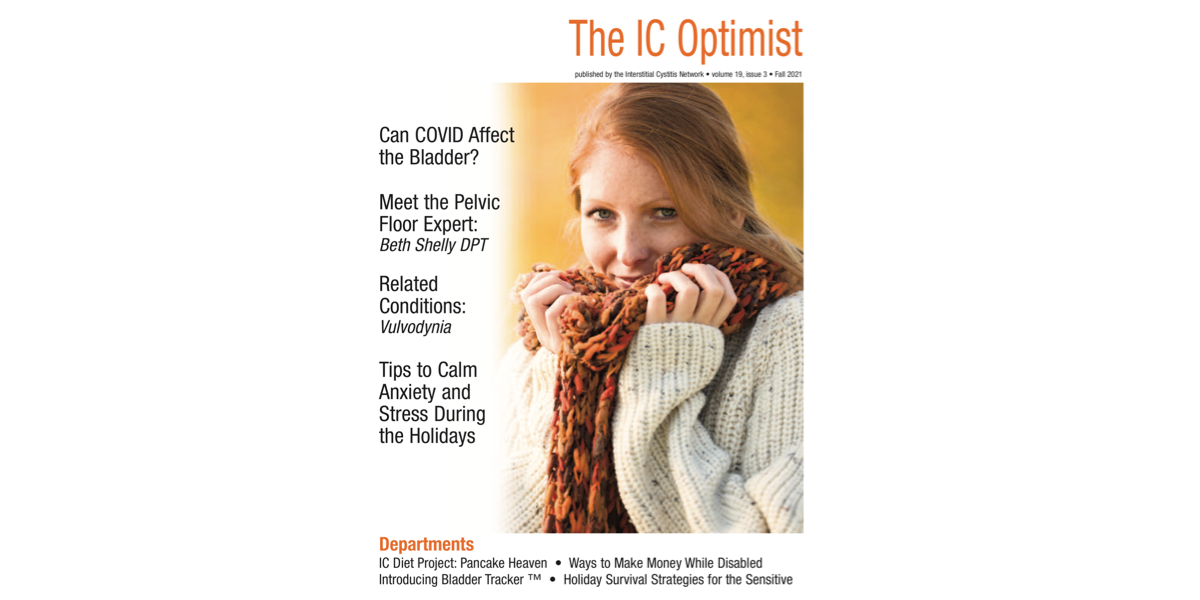The FALL issue of the IC Optimist, the magazine of the IC Network, is now available. It is currently available for download for all of our members and will be mailed shortly to those who requested printed copies! Members can now download them from their membership pages in the ICN Shop. Print issues will be mailed via USPS later this week. Our goal is to help educate, inform and empower our readers!
In this issue:
(1) Editorial – Can COVID Affect The Bladder?
There are a new group of patients that we must help. COVID associated cystitis has affected many who now suffer from the urinary symptoms that we are all familiar with. Some IC patients are also reporting long-term flares after COVID infection.
(2) Meet The Pelvic Pain Expert – Dr. Beth Shelly
Dr. Beth Shelly shares her expertise working with pelvic floor dysfunction, answering many of the questions that we receive each month about normal vs. dysfunctional muscle health and behavior. Yes, my friends, you should never be straining to empty your bladder or bowels. That is a sign that your muscles are dysfunctional.
(3) Bladder Regeneration Study
Dr. Robert Evans is leading the IC movement into a brand new future with bladder regeneration. The Wake Forest Institute of Regenerative Medicine is now able to grow new organs from a patients own stem cells. They are now looking for a few patients who might be interested in having this done to improve their bladder capacity.
(4) Related Conditions: Vulvodynia
Vulvodynia is one of the chronic overlapping pain conditions that some, but not all, IC patients struggle with. They struggle with severe discomfort similar to those of a yeast infection yet no pathogen is found. Even wearing underwear or clothing can be painful. Learn about the types of vulvodnia as well as the latest treatment and self-help information.
(5) LiRIS Update
We finally know why LiRIS was discontinued. Early on, LiRIS was thought to be a new, potential treatment for Hunner’s lesions. Unfortunately, the final research studies didn’t show success. We share the data and some thoughts on what may have happened.
(6) The Latest Research
We review six interesting IC and pelvic pain research studies released this summer, including one that shows that cyclosporine therapy has great promise for the treatment of Hunner’s lesions.
(7) Holiday Survival Strategies for the Sensitive
Now that we know that a significant number of IC patients struggle with central sensitization (aka a more sensitive central nervous system), we now understand why the holidays can be overwhelming. Something as simple as a flickering light or an unusual smell can feel irritating and perhaps even trigger a flare. Jill shares some suggestions to help protect your nervous system and enjoy the holidays.
(8) Introducing Bladder Tracker™
For the last year, we’ve been working on a new FREE application for your phones and tablets. Bladder Tracker™ allows you to track your symptoms, pain levels, diet, stress, exercise and much more with a simple, intuitive inter- face. Better yet, you can generate and email 30 day reports that can be used to track your symptoms, progress (or lack thereof) and entered into your medical records.
(9) Ways to Make Money While Disabled
From being a proofreader to testing mobile apps, new writer Ellie Lott shares several ideas for working from home.
(10) Tips To Calm Your Anxiety and Stress
Anxiety and stress can intensify pain, discomfort and flares. Stacey Shannon offers a gold mine of tips for patients to not only survive the holidays but begin the New Year with new and effective skills. Our goal? To give you more control and insight over anxiety and stress induced flares.
(11) IC Diet Project – Pancake Heaven
Frosty mornings beckon for the quintessential breakfast food – pancakes. Hot buttery goodness covered with your choice of syrup, fruit, powdered sugar or, for many, folded and eaten by hand. For the acid sensitive patient, pancakes are a great way to start your day.
(12) Pudendal Neuralgia Course for Practitioners
We hope that our readers will share this announcement with their physical therapists. The Herman Wallace Institute is offering a new course on Pudendal Nerve Dysfunction in January, taught by Dr. Michael Hibner. He will be discussing the common injuries that occur in younger patients, childbirth injuries and, for older patients, surgical mesh repair surgery, as well as the best treatment strategies.

